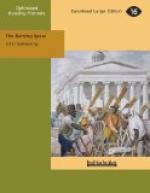“No, sir?”
“By the way, there was a wonderful leader on potatoes yesterday. We must dig up the garden. Do you know what the subsoil is?”
“Brickbats and dead cats, I expect, sir.”
“Ah! We shall soon improve that. Every inch of land reclaimed is a nail in the coffin of our common enemies.”
And going over to a bookcase, Mr. Lavender took out the third from the top of a pile of newspapers. “Listen!” he said. “’The problem before us is the extraction of every potential ounce of food. No half measures must content us. Potatoes! Potatoes! No matter how, where, when the prime national necessity is now the growth of potatoes. All Britons should join in raising a plant which may be our very salvation.
“Fudge!” murmured Mrs. Petty.
Mr. Lavender read on, and his eyes glowed.
“Ah!” he thought, “I, too, can do my bit to save England.... It needs but the spark to burn away the dross of this terrible horse-sense which keeps the country back.
“Mrs. Petty!” But Mrs. Petty was already not.
. . . . . . . . . . . . . . . . . . . . . . . . . .
The grass never grew under the feet of Mr. Lavender, No sooner had he formed his sudden resolve than he wrote to what he conceived to be the proper quarter, and receiving no reply, went down to the centre of the official world. It was at time of change and no small national excitement; brooms were sweeping clean, and new offices had arisen everywhere. Mr. Lavender passed bewildered among large stone buildings and small wooden buildings, not knowing where to go. He had bought no clothes since the beginning of the war, except the various Volunteer uniforms which the exigencies of a shifting situation had forced the authorities to withdraw from time to time; and his, small shrunken figure struck somewhat vividly on the eye, with elbows and knees shining in the summer sunlight. Stopping at last before the only object which seemed unchanged, he said:
“Can you tell me where the Ministry is?”
The officer looked down at him.
“What for?”
“For speaking about the country.”
“Ministry of Propagation? First on the right, second door on the left.”
“Thank you. The Police are wonderful.”
“None of that,” said the officer coldly.
“I only said you were wonderful.”
“I ’eard you.”
“But you are. I don’t know what the country would do without you. Your solid qualities, your imperturbable bonhomie, your truly British tenderness towards——”
“Pass away!” said the officer.
“I am only repeating what we all say of you,” rejoined Mr. Lavender reproachfully.
“Did you ’ear me say ‘Move on,’” said the officer; “or must I make you an example?”
“You are the example,” said Mr. Lavender warmly.
“Any more names,” returned the officer, “and I take you to the station.” And he moved out into the traffic. Puzzled by his unfriendliness Mr. Lavender resumed his search, and, arriving at the door indicated, went in. A dark, dusty, deserted corridor led him nowhere, till he came on a little girl in a brown frock, with her hair down her back.




